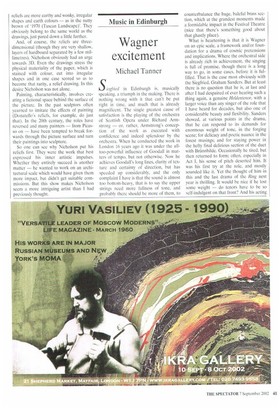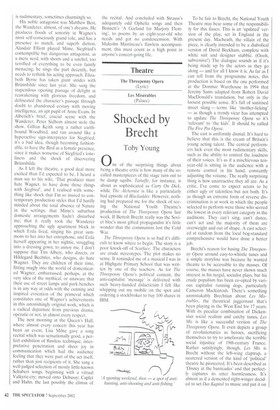Wagner excitement
Michael Tanner
reliefs are more earthy and wonky, irregular shapes and earth colours — as in the nutty brown of '1970 (Tuscan Landscape)'. They obviously belong to the same world as the drawings, just pared down a little further.
And, of course, the reliefs are threedimensional (though they are very shallow, layers of hardboard separated by a few millimetres). Nicholson obviously had an urge towards 3D. Even the drawings stress the physical materiality of the paper, which is stained with colour, cut into irregular shapes and in one case scored so as to become that rarity, a relief drawing. In this desire Nicholson was not alone.
Painting, characteristically, involves creating a fictional space behind the surface of the picture. In the past sculptors often yearned to imitate the effects of painting (Donatello's reliefs, for example, do just that). In the 20th century, the roles have reversed and many painters — from Picasso on — have been tempted to break forwards through the picture surface and turn their paintings into sculpture.
So one can see why Nicholson put his reliefs first. They were the work that best expressed his inner artistic impulses. Whether they entirely succeed is another matter — he wanted to work on an architectural scale which would have given them more impact, but didn't get suitable commissions. But this show makes Nicholson seem a more intriguing artist than I had previously thought.
Siegfried in Edinburgh is, musically speaking. a triumph in the making. There is nothing wrong with it that can't be put right in time, and much that is already magnificent. The single greatest cause of satisfaction is the playing of the orchestra of Scottish Opera under Richard Armstrong — or, rather. Armstrong's conception of the work as executed with confidence and indeed splendour by the orchestra. When he conducted the work in London 16 years ago it was under the ailtoo-powerful influence of Goodall in matters of tempo, but not otherwise. Now he achieves Goodall's long lines, clarity of texture and certainty of direction, but has speeded up considerably, and the only complaint I have is that the sound is almost too bottom-heavy, that is to say the upper strings need more fullness of tone, and probably there should be more of them, to
counterbalance the huge, baleful brass section, which at the grandest moments made a formidable impact in the Festival Theatre (nice that there's something good about that ghastly place).
What is heartening is that it is Wagner on an epic scale, a framework and/or foundation for a drama of cosmic pretensions and implications. Where the orchestral side is already rich in achievement, the singing is full of promise, though there is a long way to go, in some cases, before it is fulfilled. That is the case most obviously with the Siegfried, Graham Sanders. But at least there is no question that he is, at last and after I had despaired of ever hearing such a thing again, a genuine Heldentenor, with a larger voice than any singer of the role that 1 have heard for decades, but also one of considerable beauty and flexibility. Sanders showed, at various points in the drama, that he can respond to its demands for enormous weight of tone, in the forging scene; for delicacy and poetic nuance in the forest musings; and for staying power in the hefty final delirious section of the duet with Briinnhilde. Occasionally he tired, but then returned to form; often, especially in Act I, his sense of pitch deserted him. It was his first try at the role, and mostly sounded like it. Yet the thought of him in this and the last drama of the Ring next year is thrilling. It would be nice if he lost some weight — do tenors have to be so self-indulgent on that front? And his acting
is rudimentary, sometimes charmingly so.
His noble antagonist was Matthew Best, the Wanderer, almost, of one's dreams. He produces floods of sonority in Wagner's most self-consciously grand role, and has a presence to match, and superb diction. Alasdair Elliott played Mime, Siegfried's contemptible but dangerous antagonist, as a mere nerd, with shorts and a satchel, too terrified of everything to be even faintly menacing; he sings the part decently, but needs to rethink his acting approach. Elizabeth Byrne has taken giant strides with Briinnhilde since last year. She sang the stupendous opening passage of delight at reawakening with glorious freedom, and delineated the character's passage through doubt to abandoned ecstasy with moving intelligence, an apt pupil of Anne Evans. In Alberich's brief, crucial scene with the Wanderer, Peter Sidhom almost stole the show. Gillian Keith sang a rather earthbound Woodbird, and ran around like a hyperactive sign-interpreter for Siegfried; it's a bad idea, though becoming fashionable, to have the Bird as a female presence, since it makes nonsense of Siegfried's loneliness and the shock of discovering Brunnhilde.
As I left the theatre, a good deal more excited than I'd expected to be, I heard a man say to his wife, 'That producer must hate Wagner, to have done those things with Siegfried'. and I realised with something like shock that I'm so inured to contemporary production styles that I'd hardly minded about the total absence of Nature in the settings; that Mime's suburban domestic arrangements hadn't disturbed me; that it really took the Wanderer approaching the ugly apartment block in which Ercia lived, singing his great summons to her into her entryphone. and Erda herself appearing in her nightie, struggling into a dressing gown, to annoy me. I don't suppose that Tim Albery, who directs, or Hildegard Bechtler, who designs, do hate Wagner. They are children of their time, fitting snugly into the world of domesticated Wagner, embarrassed, perhaps, at the very idea of the mythical, or unaware that their use of street lamps and park benches is in any way at odds with the cunning and inspired evocation of the primeval which constitutes one of Wagner's achievements in this astonishingly original work, which is a radical departure from previous drama, operatic or not, in almost every respect.
The next morning at the Queen's Hall, where almost every concert this year has been an event, Lisa Milne gave a song recital which was sensationally good, a perfect exhibition of flawless technique, interpretative penetration and sheer joy in communication which had the audience feeling that they were part of the act itself, rather than just recipients of it. She sang a well-judged selection of mostly little-known Schubert songs, beginning with a virtual Valkyrie-cry; moved onto Debussy: Caplet and Hahn, the last possibly the climax of the recital. And concluded with Strauss's adequately odd Ophelia songs and then Bennett's 'A Garland for Marjory Fleming', to poems by an eight-year-old who needs and got no condescension. With Malcolm Martineau's flawless accompaniment, this must count as a high point in anyone's concert-going life.



























































 Previous page
Previous page